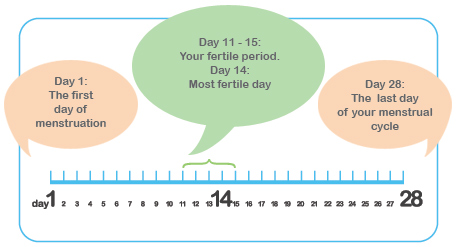Pre-Pregnancy | Falling Pregnant
Your Menstrual Cycle: How to Get Pregnant
For some couples falling pregnant is as simple as falling into bed, but for others this process is a complex labyrinth of planning. There are many factors that contribute to creating another life, but what it all boils down to in the end is perfect timing. And in order to get your timing right, you’ll have to take a closer look at a woman’s menstrual cycle.
A newborn baby girl has around 450 000 eggs stored in her ovaries. When she starts her period, usually between the ages of 11 and 14, one of these eggs will ripen each month. It’s common for teenagers and women in their forties to have longer, irregular cycles and often fewer periods. But if your cycle changes dramatically in your twenties and thirties, and your periods are heavy and long or if you bleed in between them, you should speak to your gynae about it – especially if you are trying to fall pregnant.
The menstrual cycle is described as the cyclical development and shedding of the endometrium – the lining of the uterus. In other words, the menstrual cycle is the series of changes a woman’s body goes through to prepare for a pregnancy. If you understand your cycle, you will be able to chart your fertility patterns, predict when you will ovulate and thereby increase your chances of falling pregnant.
A woman’s fertile period takes place 5-7 days before ovulation, the day of ovulation and the day thereafter. This is when you should have intercourse as you’re most likely to fall pregnant during this part of your menstrual cycle. After this period in time, the chances of conception decrease as an egg only has a life span of approximately 24 hours.
The menstrual cycle is divided into two parts: pre-ovulation and post-ovulation. Even though the length of the menstrual cycle can vary from woman to woman, it is an average of 28 days. Working with this average in mind, pre-ovulation begins on day 1 and marks the start of menstrual bleeding – lasting between 3 and 5 days. By day 7, the eggs in the ovaries will start to ripen as a result of hormonal changes. Between days 7 and 11, the lining of the uterus will begin to thicken. And after day 11, usually on day 14, the egg which is the most ripe will be released from the ovary and begin to travel down the fallopian tube toward the uterus.
Normally your cervix produces a thick, opaque mucus that sperm can’t penetrate. But just before ovulation oestrogen changes the mucus so that it becomes thin, clear and stretchy – allowing the sperm to swim through the cervix, into the uterus and up to the fallopian tubes where fertilisation may take place.
Post-ovulation is known as the Luteal phase and the start of this period is marked by a slight, measurable temperature increase. Following ovulation, the egg travels to the uterus via the fallopian tube. If conception occurs the egg is fertilised by a sperm and “implantation” occurs in the uterus. Should the egg not be fertilised within about 24 hours, however, it will expire and passed from the body at the start of the next menstrual period. The Luteal phase is usually the same length in all women, 14 days, while pre-ovulation varies in length.
Getting your timing right and achieving your goal of falling pregnant is just the start of a long and rewarding journey. You have months of pregnancy ahead of you as well as a lifetime of joy with your child!
References:
www.webmd.com
www.babycentre.co.uk



hey im extremly concerned, my bf and i reali want a baby on the 13 march i got my period 6 days after my period we had sex and then 12 days after my period and then again the following week.. this week wil be 3 weeks since the first time and 2weeks since the second time.. i spotted light blood 3 days ago and i was hopeing i was pregnant please help…
Every couple is unique and for some pregnancy will happen immediately while others struggle to fall pregnant. It has been said that couples that aren’t stressed or too focussed on having a baby often fall pregnant sooner. Try to narrow down your fertility period by using our ovulation calendar and then relax and have fun. Read through our pre-pregnancy articles for some tips and advice on how to fall pregnant and how long it should take.
ok so today i got my periods ..my bf and i are extremly sad because we wanted this..when is the best time or date to try again now fr a baby?
@Kealyn: I would suggest you use the ovulation calendar on our site and work out when your most fertile period is. Baby-making stress can decrease your chances of falling pregnant – it will happen when the time is right so you might as well relax and enjoy the ride (pun intended)!
Hi I got my last period on the 13 September 2011. I was supposed to get it again on the 10 October 2011. Nothing has come yet. I’ve had breast tenderness, feel bloated, constipated, tired, moody since 2 weeks ago. My boyfriend and i never condomise…. do you think I am pregnant? when can I test?
oh and im having menstrual cramps for the past 2 weeks as well, but no period… what is happening??
@Michaela: I would suggest doing a pregnancy test. This can be done as soon as the first day of your missed period, which was the 10th October. Best of luck.
Hi when you get pregnat on the 2nd of April and your last month period is February.when is the due date.